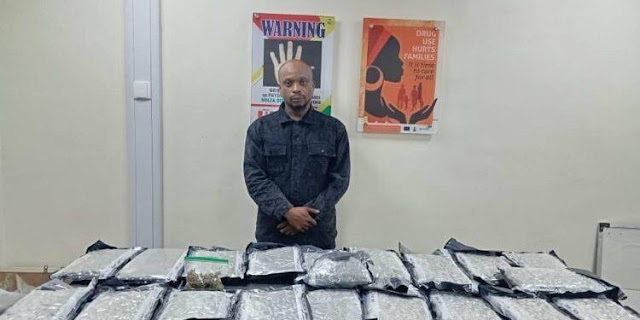In a significant blow to transnational organized crime, the National Drug Law Enforcement Agency (NDLEA) in Nigeria has successfully dismantled a sophisticated international cocaine trafficking syndicate valued at over N5.3 billion. The operation, executed with precision and intelligence-driven strategies, culminated in the arrest of two key figures identified as the masterminds behind the cartel, alongside the seizure of substantial quantities of cocaine in Lagos, Nigeria’s commercial capital. This landmark operation underscores the NDLEA’s relentless commitment to curbing the menace of drug trafficking in Nigeria and its broader implications for global security.
The Operation: A Strategic Strike Against Drug Trafficking
The NDLEA’s operation targeted a well-organized criminal network responsible for smuggling large consignments of cocaine into Nigeria, with Lagos serving as a primary hub for distribution. The agency’s spokesperson, Femi Babafemi, revealed in a statement that the breakthrough followed months of meticulous intelligence gathering, surveillance, and coordinated efforts by the NDLEA’s operatives. The operation was launched after credible information pointed to the activities of a cartel with links to international drug trafficking rings, operating across multiple continents.
On the day of the raid, NDLEA operatives stormed a clandestine location in Lagos, identified as a warehouse used for storing and distributing the illicit drugs. The raid resulted in the seizure of 99.7 kilograms of cocaine, with an estimated street value of N5.3 billion. This significant haul represents one of the largest single seizures of cocaine in Nigeria in recent years, highlighting the scale of the cartel’s operations. The drugs, concealed in carefully designed packages to evade detection, were intended for distribution within Nigeria and potentially for export to other countries.
The two kingpins arrested during the operation were described as high-profile individuals with deep connections in the global drug trade. Their identities have not been fully disclosed pending further investigations, but sources within the NDLEA indicate that the suspects are Nigerian nationals with extensive networks in South America and Europe, regions known as key sources and destinations for cocaine trafficking. The arrests mark a critical step in disrupting the supply chain of illicit drugs flowing into and out of Nigeria.
Context: Nigeria’s Role in Global Drug Trafficking
Nigeria has long been a transit point for international drug trafficking due to its strategic geographic location, porous borders, and bustling ports. Lagos, in particular, serves as a major entry point for illicit drugs due to its status as a commercial and maritime hub. The city’s Murtala Muhammed International Airport and the Tin Can Island Port have been identified as key entry points for drugs smuggled from Latin America, particularly countries like Colombia, Peru, and Bolivia, which are major producers of cocaine.
The rise of international drug cartels operating in Nigeria has been a growing concern for law enforcement agencies. These cartels exploit weaknesses in border security, corruption within institutions, and the socio-economic vulnerabilities of local populations to establish sophisticated networks. The NDLEA’s latest operation highlights the agency’s determination to confront this challenge head-on, leveraging intelligence and international cooperation to dismantle such networks.
The N5.3 billion valuation of the seized cocaine underscores the profitability of the drug trade, which continues to fuel organized crime, violence, and corruption. According to the United Nations Office on Drugs and Crime (UNODC), the global cocaine market generates billions of dollars annually, with West Africa serving as a critical transit route for drugs destined for Europe and other regions. Nigeria’s role in this trade has drawn international attention, prompting increased collaboration between the NDLEA and global partners such as the United States Drug Enforcement Administration (DEA), the United Kingdom’s National Crime Agency (NCA), and Interpol.
The NDLEA’s Evolving Strategy
The success of this operation is a testament to the NDLEA’s evolving approach to combating drug trafficking. Under the leadership of its Chairman, Brigadier General Mohamed Buba Marwa (retd), the agency has adopted a proactive and intelligence-driven strategy, moving away from reactive measures to more strategic interventions. Marwa, a seasoned military officer with a reputation for discipline and results, has prioritized strengthening the NDLEA’s capacity through training, technology, and international partnerships.
Since Marwa’s appointment in 2021, the NDLEA has recorded significant achievements, including the arrest of over 36,000 drug traffickers and the seizure of thousands of kilograms of illicit drugs, ranging from cannabis to cocaine and methamphetamine. The agency has also intensified efforts to disrupt the financial networks that sustain drug cartels, targeting money laundering operations and assets acquired through illicit proceeds.
The recent operation in Lagos reflects the NDLEA’s use of advanced intelligence-gathering techniques, including surveillance, informants, and data analysis. By tracking the movements of the cartel’s key players and monitoring their communication channels, the agency was able to pinpoint the location of the cocaine consignment and execute a swift raid. This approach aligns with global best practices in combating organized crime, where intelligence and collaboration are critical to success.
The Kingpins: Profiles of the Arrested Suspects
While the NDLEA has not publicly released the names of the arrested kingpins, preliminary reports suggest that they are individuals with significant influence in the drug trafficking underworld. Sources indicate that the suspects have been involved in the trade for over a decade, building a network that spans multiple countries. Their operations reportedly involved the use of legitimate businesses as fronts to conceal their illicit activities, a common tactic employed by drug cartels to launder money and evade detection.
The kingpins’ connections to international suppliers highlight the complexity of the global drug trade. Cocaine, primarily produced in South America, is often smuggled through West Africa en route to Europe, where demand remains high. The cartel’s ability to operate across borders suggests a high level of sophistication, including the use of encrypted communication, intermediaries, and corrupt officials to facilitate their activities.
The NDLEA has vowed to continue its investigation to uncover additional members of the syndicate and their international collaborators. The agency is also working to trace the financial transactions linked to the cartel, with the aim of seizing assets and disrupting the economic foundations of the drug trade.
Broader Implications: Impact on Society and Security
The dismantling of this cartel has far-reaching implications for Nigeria and the global fight against drug trafficking. At the local level, the influx of illicit drugs like cocaine fuels addiction, crime, and social instability. Nigeria has seen a rise in drug-related violence, particularly in urban centers like Lagos, where gangs and criminal networks compete for control of the drug market. The availability of hard drugs also exacerbates public health challenges, with increasing cases of addiction and related mental health issues.
On a global scale, the operation sends a strong message to international drug cartels that Nigeria is no longer a safe haven for their activities. The NDLEA’s collaboration with foreign agencies demonstrates the importance of cross-border cooperation in tackling transnational crime. By disrupting the supply chain, the agency is not only protecting Nigerian citizens but also contributing to global efforts to reduce the flow of illicit drugs.
The economic impact of the drug trade cannot be overstated. The N5.3 billion worth of cocaine seized in this operation represents a significant financial loss for the cartel, potentially weakening its ability to operate. However, the profitability of the trade means that other groups may attempt to fill the void, underscoring the need for sustained efforts to combat drug trafficking.
Challenges in the Fight Against Drug Trafficking
Despite the NDLEA’s success, significant challenges remain in the fight against drug trafficking in Nigeria. One of the primary obstacles is the country’s porous borders, which allow smugglers to move drugs and other contraband with relative ease. Nigeria shares borders with Benin, Niger, Chad, and Cameroon, all of which have been identified as transit points for illicit goods. Strengthening border security and improving coordination with neighboring countries are critical to addressing this issue.
Corruption within law enforcement and other institutions also poses a significant challenge. Drug cartels often rely on corrupt officials to facilitate their operations, whether through bribes, intimidation, or collusion. The NDLEA has taken steps to address internal corruption, including the dismissal and prosecution of erring officers, but systemic issues persist.
Another challenge is the socio-economic factors that drive individuals into the drug trade. Poverty, unemployment, and lack of opportunities make vulnerable populations, particularly youth, susceptible to recruitment by cartels. Addressing these root causes requires a multi-faceted approach, including investments in education, job creation, and social welfare programs.
International Cooperation and the Way Forward
The NDLEA’s collaboration with international partners has been a key factor in its recent successes. Agencies like the DEA, NCA, and Interpol provide technical assistance, training, and intelligence-sharing that enhance the NDLEA’s capacity to tackle sophisticated criminal networks. For example, the use of advanced tracking technologies and forensic analysis has enabled the agency to identify and intercept drug shipments with greater accuracy.
Moving forward, the NDLEA plans to deepen its partnerships with global law enforcement agencies to target the international dimensions of the drug trade. This includes working with South American authorities to disrupt the supply of cocaine at its source and collaborating with European agencies to track the flow of drugs into their markets. The agency is also exploring the use of technology, such as drones and artificial intelligence, to enhance its surveillance capabilities.
At the domestic level, the NDLEA is intensifying its efforts to raise public awareness about the dangers of drug abuse and trafficking. Community engagement programs, school outreach initiatives, and media campaigns are being deployed to educate Nigerians about the social and economic costs of the drug trade. By fostering a culture of zero tolerance for drugs, the agency hopes to reduce demand and weaken the market for illicit substances.
Legal and Judicial Implications
The arrest of the cartel’s kingpins is expected to lead to a high-profile trial, with the NDLEA preparing to prosecute the suspects under Nigeria’s anti-drug laws. The agency has a strong track record of securing convictions in drug-related cases, thanks to its robust evidence-gathering processes and collaboration with the judiciary. However, the complexity of international drug trafficking cases often requires navigating legal challenges, including extradition requests and cross-border investigations.
The NDLEA has called for stricter penalties for drug traffickers, arguing that the current legal framework does not sufficiently deter high-level offenders. Proposals for asset forfeiture laws and harsher sentences for kingpins are under consideration, with the aim of dismantling the financial incentives that drive the drug trade.
Conclusion: A Step Toward a Drug-Free Nigeria
The dismantling of the N5.3 billion cocaine cartel and the arrest of its kingpins represent a significant milestone in Nigeria’s fight against drug trafficking. The operation demonstrates the NDLEA’s growing capacity to tackle sophisticated criminal networks and sends a clear message to drug lords that their activities will not go unpunished. However, the battle is far from over. Sustained efforts, including enhanced border security, international cooperation, and socio-economic interventions, are essential to address the root causes of drug trafficking and its devastating impact on society.
As Nigeria continues to grapple with the challenges of organized crime, the NDLEA’s success in this operation serves as a beacon of hope. By building on this achievement and addressing the systemic issues that enable the drug trade, Nigeria can move closer to its goal of becoming a drug-free nation. The agency’s commitment to this cause, coupled with the support of international partners and the Nigerian public, will be crucial in sustaining the momentum and ensuring lasting change.






